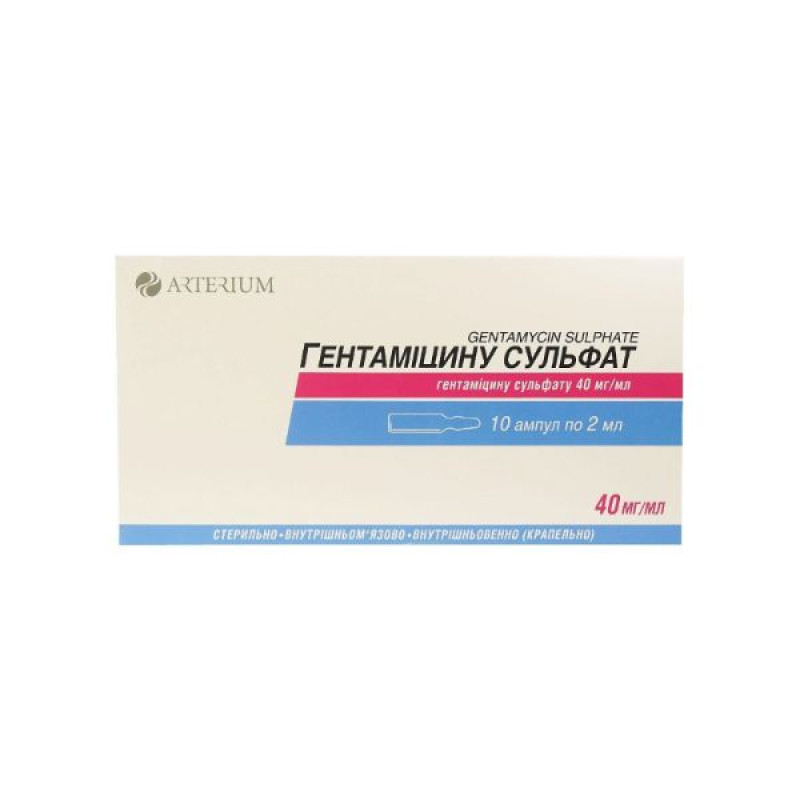Gentamicin sulfate solution for injection 4% ampoule 2 ml No. 10

Gentamicin sulfate is an antimicrobial agent for systemic use.
Indications for use
sepsis; urinary tract infections; lower respiratory tract infections; skin, bone, and soft tissue infections; infected burn wounds; central nervous system (CNS) infections (meningitis), in combination with ß-lactam antibiotics; abdominal infections (peritonitis).Warehouse
1 ml contains gentamicin sulfate (calculated as gentamicin and anhydrous substance) 40 mg; excipients: sodium metabisulfite, disodium salt of ethylenediaminetetraacetic acid, water for injection.Contraindication
Hypersensitivity to the components of the drug/aminoglycoside antibiotics, chronic renal failure with azotemia and uremia, acoustic neuritis, myasthenia gravis, parkinsonism, botulism (gentamicin can cause neuromuscular transmission disorders, which can lead to further weakening of skeletal muscles), old age, previous treatment with ototoxic drugs. A limitation to the use of the drug is acute renal failure.
Method of application
Adults and children over 14 years of age. The usual daily dose for patients with moderate/severe infections is 3 mg/kg body weight intramuscularly, divided into 2–3 doses. The maximum daily dose for adults is 5 mg/kg, divided into 3–4 doses. The usual duration of treatment for all patients is 7–10 days.
Application features
Due to its broad spectrum of action, gentamicin is often prescribed for mixed infections, as well as in cases where the pathogen is not identified, usually in combination with semi-synthetic penicillins (ampicillin, carbenicillin).
In patients with kidney disease, it is necessary to regularly monitor the concentration of gentamicin in the blood serum and kidney function, as well as the functions of the auditory and vestibular apparatus.
Pregnant women
Due to the fact that gentamicin sulfate penetrates the placenta and can have a nephrotoxic effect on the fetus, the drug is contraindicated for use during pregnancy.
The drug penetrates into breast milk, so you should either stop breastfeeding or refuse to use the drug.
Children
Children under 3 years of age are prescribed gentamicin sulfate exclusively for vital indications.
Drivers
There are no data on the effect of gentamicin on the ability to drive a car or other mechanisms. However, in some patients, the drug in high doses may cause balance disorders, accompanied by nausea and dizziness, therefore, during therapy, it is recommended to refrain from engaging in potentially hazardous activities that require increased concentration and speed of psychomotor reactions (including driving vehicles and other mechanisms).
Overdose
Symptoms: dizziness, nausea, vomiting, nephrotoxicity, ototoxicity, neuromuscular blockade with respiratory failure.
Side effects
Electrolyte disturbances: hypomagnesemia, hypocalcemia, and hypokalemia.
On the part of the digestive tract: stomatitis, nausea, vomiting, increased salivation, loss of appetite, weight loss, pseudomembranous colitis.
Immune system disorders: allergic reactions including skin rash, urticaria, pruritus, fever, purpura. Anaphylactic reactions and endotoxic shock. Dyspnoea, angioedema.
On the part of the blood: thrombocytopenia, granulocytopenia, anemia, leukopenia.
Changes in laboratory parameters: increased levels of serum transaminases (ALT, AST), bilirubin, reticulocytes.
From the side of the central nervous system: headache, drowsiness, neurotoxicity (encephalopathy, confusion, lethargy, hallucinations, seizures and depression), peripheral neuropathy.
Cardiovascular system: hypotension.
Storage conditions
Store in the original packaging at a temperature not exceeding 25 ºС.
Keep out of reach of children.
There are no reviews for this product.
There are no reviews for this product, be the first to leave your review.
No questions about this product, be the first and ask your question.



